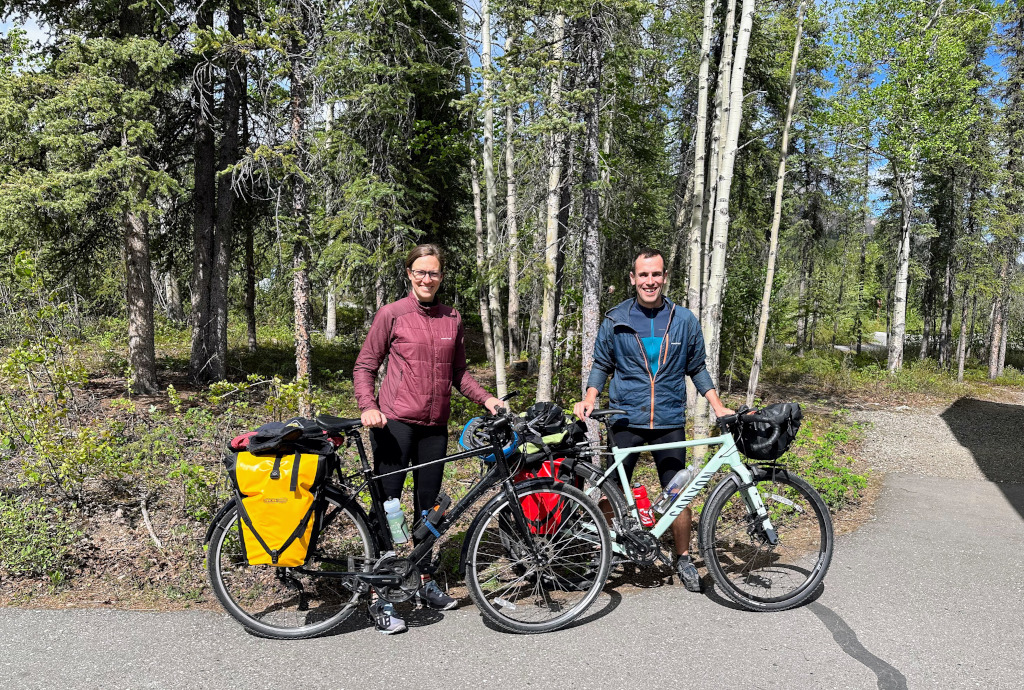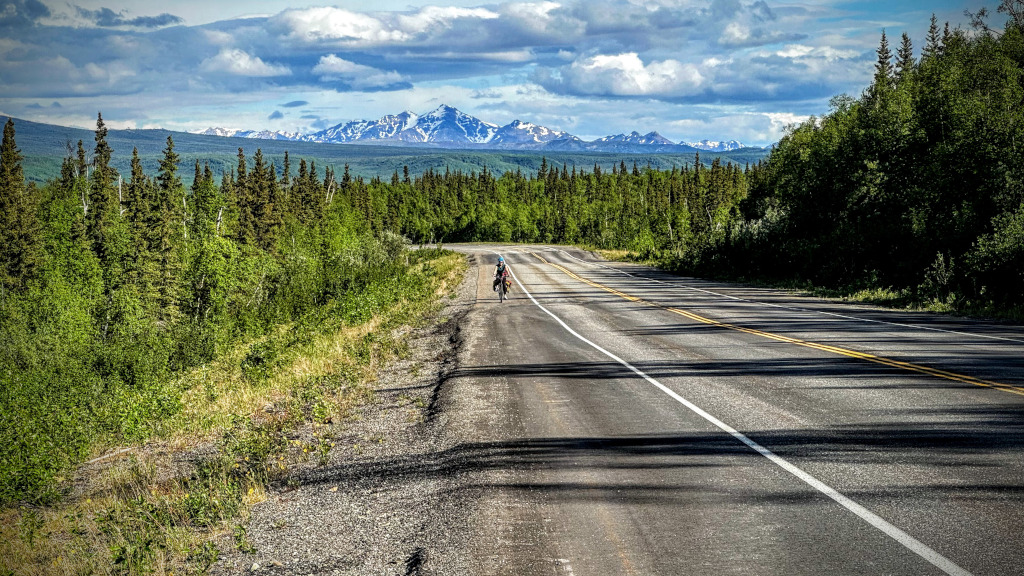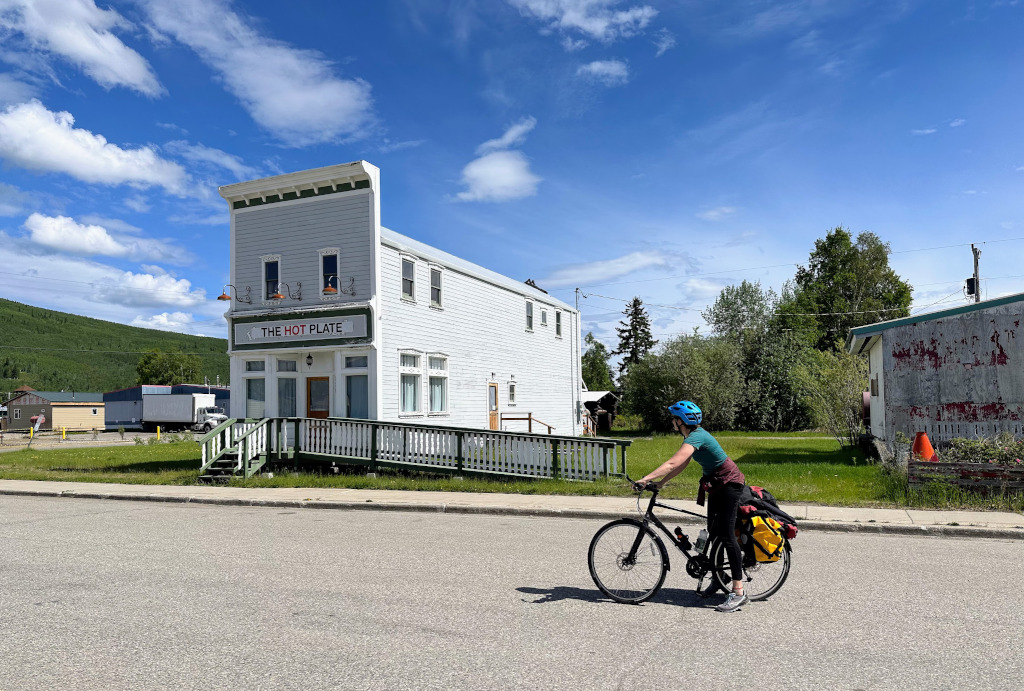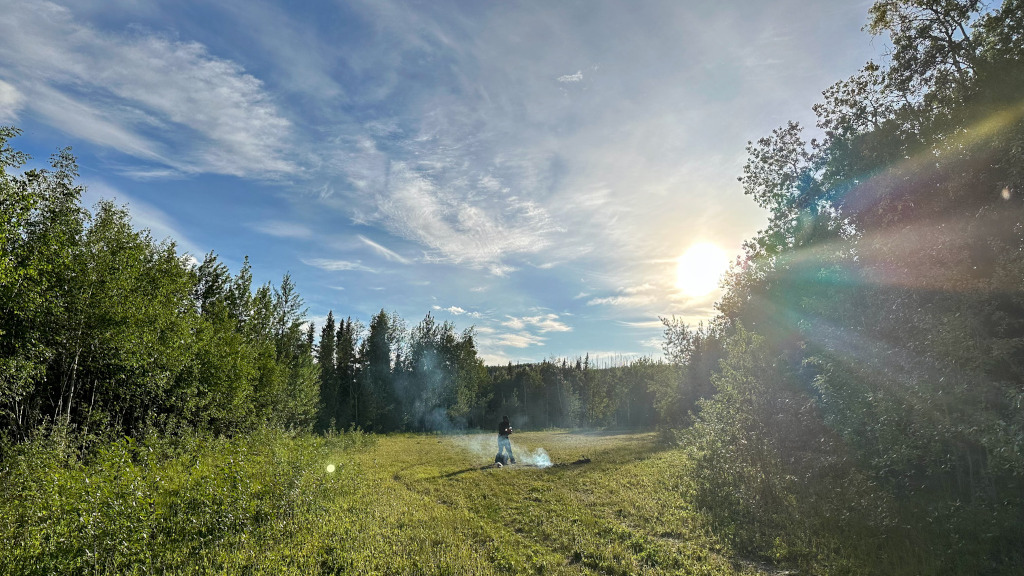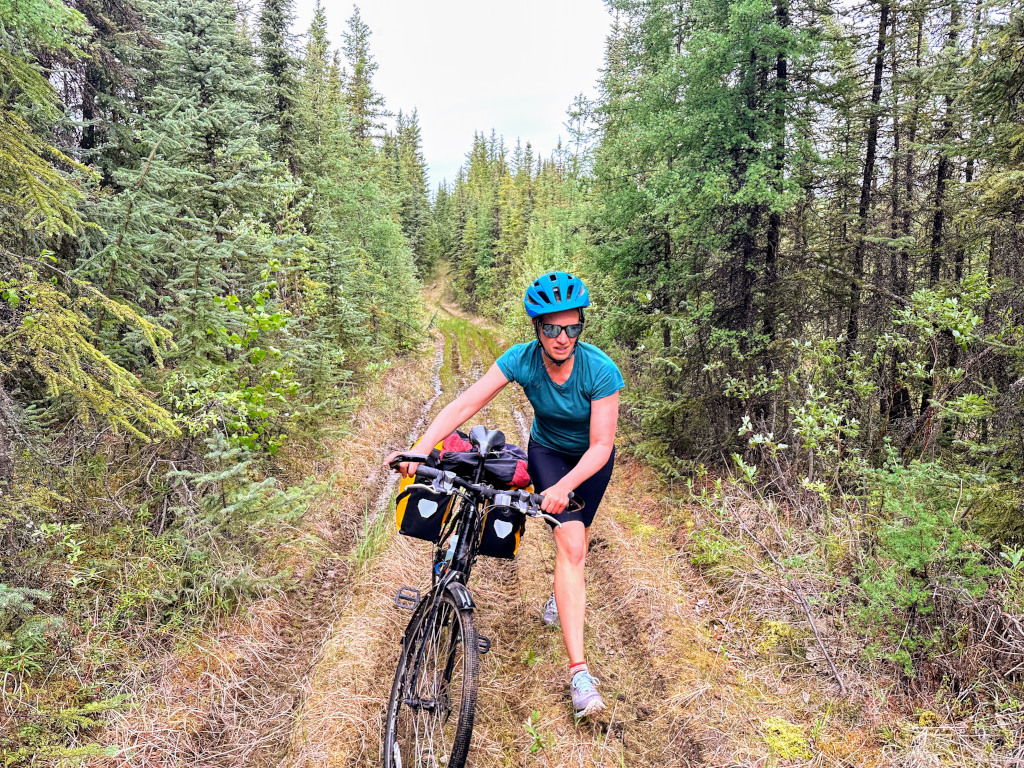Here we go again
We land in Fairbanks and pick up our two bike boxes, one 50lb food box, one duffel bag with more food and a backpack with gear. In the spacious halls of the Airport, we put the bikes back together. Getting to the hotel is already an ordeal. Salomé takes a taxi with the boxes, bag, two backpacks, while Ricardo manages to bike to the hotel while balancing Salomé’s bike with one hand. We still have a lot to do. We need to bring the food box to the airline that will ship it to Anaktuvuk Pass, organize our food for the other sections, and we need to buy bear sprays (one each) and a flare gun (extra bear safety!). Finally, we want to meet the friendly bike shop owner that agreed to receive and store our bikes at the end of the biking section.
The logistics of this part of the trip are significantly more difficult than all the sections we did in 2021, partially because we are adding bikes to the mix and also because we are going to cross the most remote part of Alaska. We’ll have towns and settlements along the Haul Road, but as soon as we set off from the road in 11 days, there will be just two towns on our route: Anaktuvuk Pass, a Nunamiut village fairly close to the road, and Noatak, an Inupiaq village fairly close to our endpoint, Kotzebue. In between, there are four weeks of hiking and paddling with no settlements, and we are unlikely to encounter anyone.
When we planned the route the first time around, we struggled figuring out how to get from the Alaska Range to the Brooks Range. In between, there are the Yukon Flats, a very large swamp surrounding the Yukon River. Crossing it on foot is very challenging and definitely not fun. Luckily, there’s also a road that connects the Alaska Range to the oil fields in the Arctic, that crosses the Brooks Range 400 miles north of Fairbanks. We talked about walking it, but it is 480 miles of road walking from Denali NP, hard on the feet and boring. Without great options, we decided to bike to the Brooks range, which Ricardo was looking forward to, and which would shorten our trip considerably.
We inquire with the friendly bike shop owner in Fairbanks about the road we are about to bike. He tells us that usually people that bike from Alaska to Patagonia start on the Arctic Ocean, and by the time they reach Fairbanks they are humbled by the remoteness of this first section. He also tells us that there is a rabid wolf on the Haul Road pretty far north attacking cars. Concerned, we decide to buy a third bear spray. If we have to use one on the road, we would be left with only one for the rest of our trip without being able to buy a new one.
We want to reconnect our footsteps, and continue the trip North, exactly from where we headed east on the Alaska Range in our second bout in July 2021. The easiest way to get there is to take the train to Denali National Park and bike north ten miles to Healy. Ricardo is looking forward to biking, it reminds him of his first long bikepacking trip in New Zealand 12 years ago. For Salomé everything is new. She has only bikepacked twice, including a short training ride along the bicycle rail line in the Snoqualmie valley, which was already hard for her. Now heading off to bike one of the most remote and dangerous roads of the United States makes her nervous. She has never biked 45 miles per day, and she’ll have to bike every day for 11 days. Luckily, the first three days from Denali National Park to Fairbanks should be easier. This section is still fully paved and we’ll cross towns in case something goes wrong.
After running errands the whole evening, we get up early and bike towards the train station. As we turn right towards the train station, a large van follows us, a bit too closely for our liking. We push our bikes to the check in counter for larger luggage. We realize that Salomé already has a flat. How many more will we get on the rugged roads? We joke that this is probably the nicest place to fix her tire, after all, the station is pretty nice, including its adorable model railroad.
The ride on the train is delightful and relaxing. We go to the restaurant car to get a warm drink. The clerk recognizes us, he was in the van just as we pulled into the train station, and he tells us that seeing us in the morning biking to the train put a smile on his face. Drinks are on him, and he thanks us for what we are doing. We are speechless, we often think of our trip as a selfish endeavor that we do for ourselves. Hearing this touches us. We sit down and enjoy the beautiful boreal forest we are crossing. It reminds us of taking the train in July 2021. In Denali National Park, we pick up our bikes and start biking towards a brewery that we know from the last time we were here. After some good food, we set off late. When we get to Healy, we religiously take the turn down to the river, to reconnect to where we started hiking in July 2021, reconnecting “footsteps”, ignoring the significant hill we have to climb back up to the main road.
We bike away from the gorgeous Alaska Range, admiring large rivers and forests. It is beautiful, and despite the exhaustion we feel, we are happy to be back in Alaska. We cross our first bikepackers. It is a strange and beautiful feeling for us. So far we have never crossed a fellow adventurer on our hike and paddle through Alaska. Salomé can’t stop thinking about how she used to watch other adventurers, envious and thinking that she’d never be able to go on an adventure herself. And now she’s doing the same thing.
We stop at a river, climb down the steep bank with our bikes, and camp in a forest. It is sunny; we just set up the mosquito net of our tent. The mosquitoes are plentiful, so we quickly put on our raingear to protect ourselves. We hadn’t felt the mosquitoes today, we had only a few uphills and as long as we biked fast enough, the mosquitoes could not bite us. After a restful night, we set out again. We make good progress even though our butts start hurting more. We reach the quaint town of Nenana and stop at the historic train station which has been turned into a museum. We enjoy a snack in the shade when the owner of the gift shop comes out to offer us some water bottles. We are touched by his kindness and come inside to visit. He restored the building with so much care. He tells us that this is one of his many retirement projects. He also introduces us to the local tradition: the Nenana Ice Classic. For $3 people buy a lottery ticket and bet on the time the river breaks up. A wooden tripod is placed on the river and attached to shore. When the river melts and the tripod falls into the water, that’s the time of the break up. The person that guesses correctly the date and time wins. We decide to each buy a ticket and guess on times. Ricardo says: “If we win, we move to Alaska!” (Sadly, neither of us won.)
We stop a couple of miles later at a diner. We want to eat fresh food as long as we can. Soon enough we’ll only eat what we packed in ziplock bags. After a long climb, we decide to camp. We have made good progress, and are less than 20 miles away from Fairbanks, tomorrow should be an easy day. There are so many mosquitoes, we struggle to enjoy the evening. Even a fire, on which we throw fresh grass to create more smoke, struggles to keep them away. We worry. How will we deal with mosquitoes once we are hiking? They are supposed to be much worse further north.
We have realized before that we make the biggest mistakes when we are close to a destination and it feels easy to get there. Salomé fell into a river a mile before town two years earlier, destroying her phone. And this time we only had 17 miles left to Fairbanks which would take us only a couple of hours and then we’d have plenty of time to soak in the bathtub of our hotel room or relax in a coffee shop. Why not explore some of the trails Salomé found on the map and satellite imagery to make this last day more interesting? It all starts well, we descend a four-wheeler track through a beautiful forest. But soon, the ground becomes soft to pedal, and we start pushing. Mosquitoes swarm us, Salomé feels so overwhelmed by them that she does not want to stop. A huge mistake! We get hundreds of mosquito bites within minutes. Eventually, she stops and we put our raingear on, the best protection against mosquitoes. Instead of turning around and biking back up to the road, we continue forward. It gets worse and worse, we push our bikes through water, sometimes nearly reaching our knees. It is exhausting. We keep wiping mosquitoes from our faces, unable to stop and eat. We have now crossed such bad terrain that we don’t want to turn around and stubbornly continue. We reach a better gravel road and descend only to see it disappear into another swamp. We push our bikes up the hill and find another track that climbs back to the main road. We stuff food into our mouths without stopping, but Salomé starts feeling weaker and weaker. Stopping every half mile, we slowly make our way back to the road, and then on to Fairbanks. Salomé can barely bike up the last little hill before town. Ricardo knows that she is starting to bonk and that she needs food, quickly! We rush to find a restaurant open between lunch and dinner, ending up in an empty Japanese BBQ place. Slowly, Salomé recovers. Back at the hotel, Salomé collapses onto the bed, she is so exhausted from bonking. Both our faces and hands are swollen; we have hundreds of bites just on our faces. We buy more antihistamine and store our headnets and gloves on top of our bags for the next day to be better prepared.
Despite the rough ending to our day, we are excited about the adventure ahead. After all, what’s an adventure without a few mosquito bites and wrong turns?
